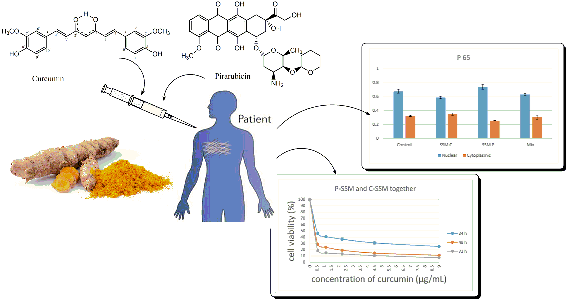JOURNAL 984
Records of Natural Products
Year: 2019 Issue: 5 September-October
p.390 - 404
Viewed 3770 times.
-
Zahra Eskandari

-
Fatemeh Bahadori

-
Melda Altikatoglu

-
Vildan Betul Yenigun

-
Abdurrahim Kocyigit

-
Hayat Onyuksel

GRAPHICAL ABSTRACT

ABSTRACT
This study aims to investigate the effects of co-administration of nano-Curcumin on anticancer effect of nano-Pirarubicin considering the fact that the clinical use of Pirarubicin and other anthracyclines has been limited by development of multidrug resistance (MDR) and based on previous data which have shown that Curcumin can down-regulate MDR proteins and suppress the activity of Nuclear factor-kappa B (NF-κB) a protein involved in chemoresistance. Nano micellar formulations of both Curcumin and Pirarubicin were separately synthesized using 1,2-Distearoyl-sn-glycero-3-phosphoethanolamine-N-methoxy-[poly(ethylene glycol); PEG MW 2,000] (DSPE-PEG2000). The produced sterically stabilized micelles (SSM) are very well known drug delivery systems in terms of their enhanced efficacy and good toxicity profile. We measured the differences of NF-κB levels in two different situations: when Pirarubicin is used alone and when it is co-administered with Curcumin. This study showed that co-administration of SSM-Curcumin (CSSM) and SSM-Pirarubicin (PSSM) with size of 12.81 nm enhances the efficacy of Pirarubicin by suppressing P65, an NF-κB subunit. Furthermore, we showed that SSM is able to successfully enhance water solubility and therapeutic stability of curcumin for using as a complementary agent.
KEYWORDS- Curcumin
- pirarubicin
- nanoparticles
- NF-κB
- breast cancer